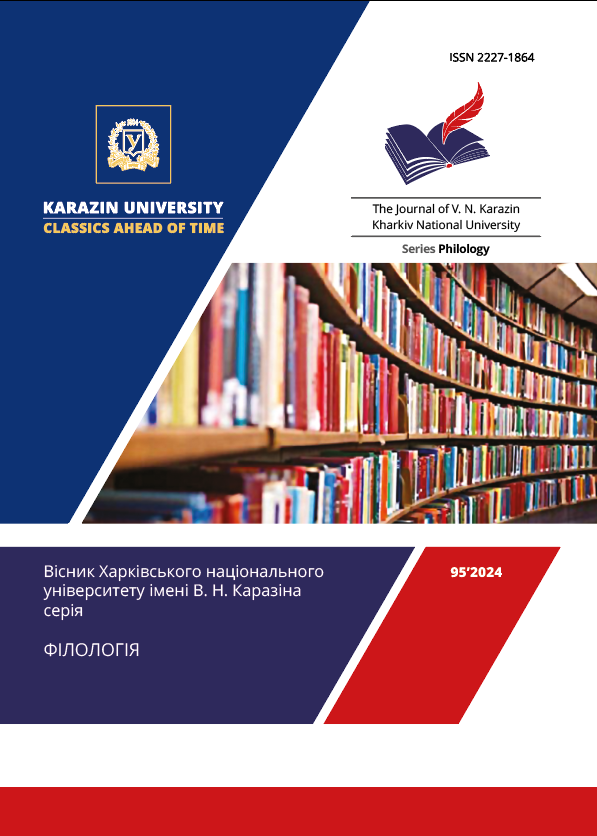D. M. Ovsianyko-Kulikovsky as an Orthologist: the Cognitive-evolutionary Coverage
Abstract
The article is devoted to the cognitive-evolutionary coverage of D. M. Ovsianyko-Kulikovsky's beliefs as an orthologist who expressed his orthological convictions regarding the norms of syntactic agreement of adjectives with homogeneous noun phrases. The scholar categorically denied the possibility of such agreement in the plural, despite the fact that in the eighteenth century such agreement was already quite common in usage as a logical agreement of the plural adjective with more than one noun.
The article proves that, defending the illogical agreement of such adjectives in the singular, the scientist demonstrates a superficial perception of such agreement as necessary only with regard to one, closest postpositive noun in the syntagm. The main provisions of the cognitive-evolutionary theory of language are revealed, the essence of which involves the algorithm "perception → logic of thinking → logic of language" and one of the central concepts of which is the concept of superficiality of perception as an orientation to the closest, most noticeable features of phenomena, the categorization of which is often erroneous.
Attention is drawn to the fact that the scientist's arguments against the possibility of the considered plural agreement are characterized by emotionality, unscientific nature and disregard for the opposite beliefs of both journalists of his time and famous linguists - both his predecessors and contemporaries ‒ unjustified for the scientific style. It is emphasized that such a position of D. M. Ovsianyko-Kulikovsky is an argument to taste, i.e. one of the two weakest arguments in the theory of argumentation, which in linguistics can be used only to characterize stylistic phenomena, which the agreement under consideration is not.
The article concludes that, denying the possibility of such agreement, D. M. Ovsyanyko-Kulikovsky was a very conservative orthologist who, guided by superficial perception, neglected the linguistic facts of usage, journalists and other linguists. Since he had and still has his followers, whose books are still being reprinted, we can speak of the existence of an anti-language-evolutionary conservative party in Russian-language orthology, which can be recognized as quite natural for Russian society as a whole.
Downloads
References
Belchikov Yu. A. (2008). Practical stylistics of the modern Russian language. M.: AST-PRESS KNIGA. 424 p. [in Russian]
Buslaev F. I. (1959). Historical grammar of the Russian language. M.: State. educational and pedagogical publishing house of the Ministry of Education of the RSFSR. 623 p. [in Russian]
Golub I. B. (2007). Stylistics of the Russian language. 8th ed. M.: Iris-press. 448 p. [in Russian]
Lomonosov M. V. (1952). Russian grammar. Lomonosov M. V. Complete works. V. 7. Works on philology 1739-1758. M.-L.: Publishing House of the USSR Academy of Sciences. P. 389-578. [in Russian]
Ovsyaniko-Kulikovsky D. N. (1907). A guide to studying the syntax of the Russian language. M.: Ed. Sytina. 237 p. [in Russian]
Piaget J. (1969). Psychology of intelligence. Piaget J. Selected psychological works. Psychology of intelligence. Genesis of number in a child. Logic and psychology. Transl. from French. M.: Education. P. 55-231. [in Russian]
Popov S. L. (2023). Cognitive-evolutionary theory of language: justification. Cognition, communication, discourse. No. 26. P. 123-139. [in Ukrainian]
Rosenthal D. E. (1977). Practical stylistics of the Russian language. 4th ed., rev. M.: Vyshcha shkola. 316 p. [in Russian]
Solganik G. Ya. (2010. Practical stylistics of the Russian language: textbook. aid for students filol. and zhur. fak. higher textbook establishments. 4th ed., erased. M.: Publishing center "Academy". 304 p. [in Russian]
Solso R. (2011). Cognitive psychology. Per. from English S. Komarov. 6th ed. St. Petersburg: Peter. 589 p.: ill. (Masters of Psychology). [in Russian]
Chernyshev V. I. (1970). Correctness and purity of Russian speech. Experience of Russian stylistic grammar. Chernyshev V. I. Selected works in 2 volumes. Comp. A. M. Iordansky, V. G. Kostomarov, I. F. Protchenko. V. 1. Enter. article by acad. V. V. Vinogradova. M.: Education. P. 443-641. [in Russian]
Shakhmatov A. A. (1941). Syntax of the Russian language. L.: Uchpedgiz. 606 p.
Lévy-Bruhl L. (1931). Le surnaturel et la nature dans la mentalité primitive. Paris: F. Alcan. 293 p. [in French]
Pruetz J. D. (2007). Evidence of cave use by savanna chimpanzees (Pan troglodytes verus) at Fongoli, Senegal: Implications for thermoregulatory behavior. Primates. 48(4). P. 316-319. [in English]
Read D. W. (2008). Working memory: A cognitive limit to non-human primate recursive thinking prior to hominid evolution. Evolutionary Psychology. 6. P. 676-714. [in English]




